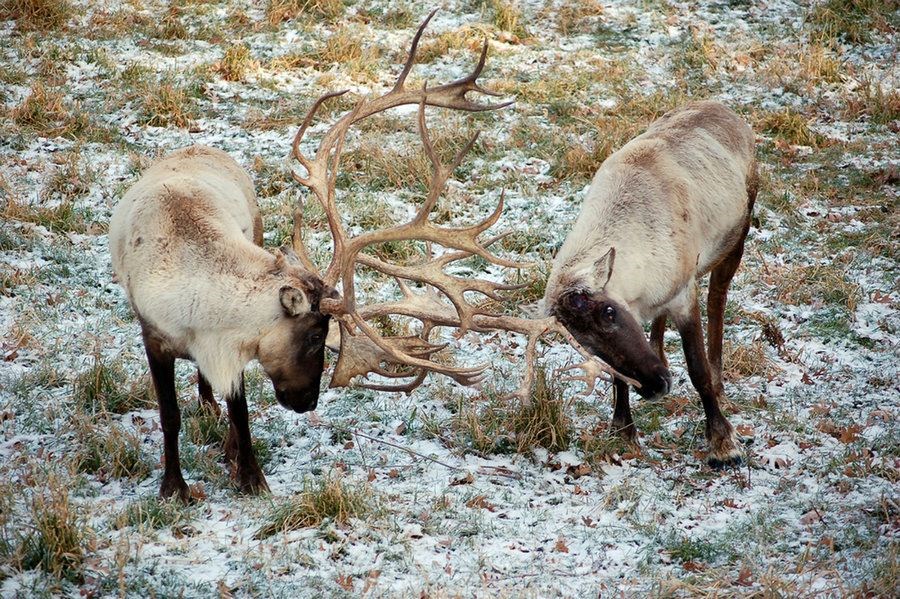Reprinted with permission from The Christian Science Monitor
The list of words that English has adopted from Native American languages could go on for hundreds of pages and include vocabulary in the spheres of technology, politics, and insult.
I’m from Wisconsin, where hundreds of place names have Native American origins. I grew up in Milwaukee, Ojibwa/Potawatomi for “pleasant land” or “gathering place by the water.” My parents are from Sheboygan – “needle” or “pathway between the waters.” And we go to Minocqua, or “noon-day rest,” on vacation. Wisconsin itself probably comes from meskonsing, a Miami word meaning “it lies red,” which describes the Wisconsin River as it runs through red sandstone bluffs. Wisconsin isn’t unusual: Twenty-six US state names seem to derive from Native American words, from Alabama to Ohio to Wyoming.
 Two caribou are seen in northwest Montana. Caribou is an Anglicization of the Mi’kmaq qlipu, meaning “snow-shoveler,” because in winter these large reindeer dig in the snow to find lichens.Montana Fish, Wildlife and Parks via APNative American languages have also given English many common names of plants and animals. When Europeans arrived in North America, they encountered lots of species they had never seen before and often adopted the names in use around them. English thus got skunk from the Massachusett people, chipmunk and muskellunge – “ugly pike” – from the Ojibwa, and raccoon,opossum, and moose from various other Algonquian languages. Caribou is an Anglicization of the Mi’kmaq qalipu, meaning “snow-shoveler,” because in winter these large reindeer dig in the snow to find lichens. Several of our names for different kinds of salmon come from languages of the Pacific Northwest: sockeye and coho are from Halkomelem, which also gave us Sasquatch, the legendary Bigfoot.
Two caribou are seen in northwest Montana. Caribou is an Anglicization of the Mi’kmaq qlipu, meaning “snow-shoveler,” because in winter these large reindeer dig in the snow to find lichens.Montana Fish, Wildlife and Parks via APNative American languages have also given English many common names of plants and animals. When Europeans arrived in North America, they encountered lots of species they had never seen before and often adopted the names in use around them. English thus got skunk from the Massachusett people, chipmunk and muskellunge – “ugly pike” – from the Ojibwa, and raccoon,opossum, and moose from various other Algonquian languages. Caribou is an Anglicization of the Mi’kmaq qalipu, meaning “snow-shoveler,” because in winter these large reindeer dig in the snow to find lichens. Several of our names for different kinds of salmon come from languages of the Pacific Northwest: sockeye and coho are from Halkomelem, which also gave us Sasquatch, the legendary Bigfoot.
Before we called pumpkins and zucchini squash, they were known as squanter-squash or even isquoutersquashes, closely resembling their linguistic ancestor, the Narragansett askutasquash. Pecan comes from Algonquian terms that identify “nuts with shells that must be cracked with a stone” and once included hickory nuts and walnuts.
These are only a few of the words that English has adopted from Native American languages; the list could go on for hundreds of pages and include words in the spheres of technology, politics, and insult.
The exchange also worked in the other direction, although evidence for it is scarce. Most speakers of Native American languages did not keep written records, and almost half of the languages themselves are now extinct, with many more on the verge.
In 1643 Roger Williams published a Narragansett-English phrasebook in which he noted that the Indians had adopted English words to identify the strange new creatures the Pilgrims and Puritans had brought. They Narragansett-ized the names of the imported animals, producing côwsnuck, gôatesuck, hógsuck, and pígsuck.
On Thanksgiving I’ll be thinking about this legacy of linguistic exchange – and linguistic annihilation.
Page created on 11/27/2018 9:01:03 AM
Last edited 11/27/2018 9:29:03 AM
